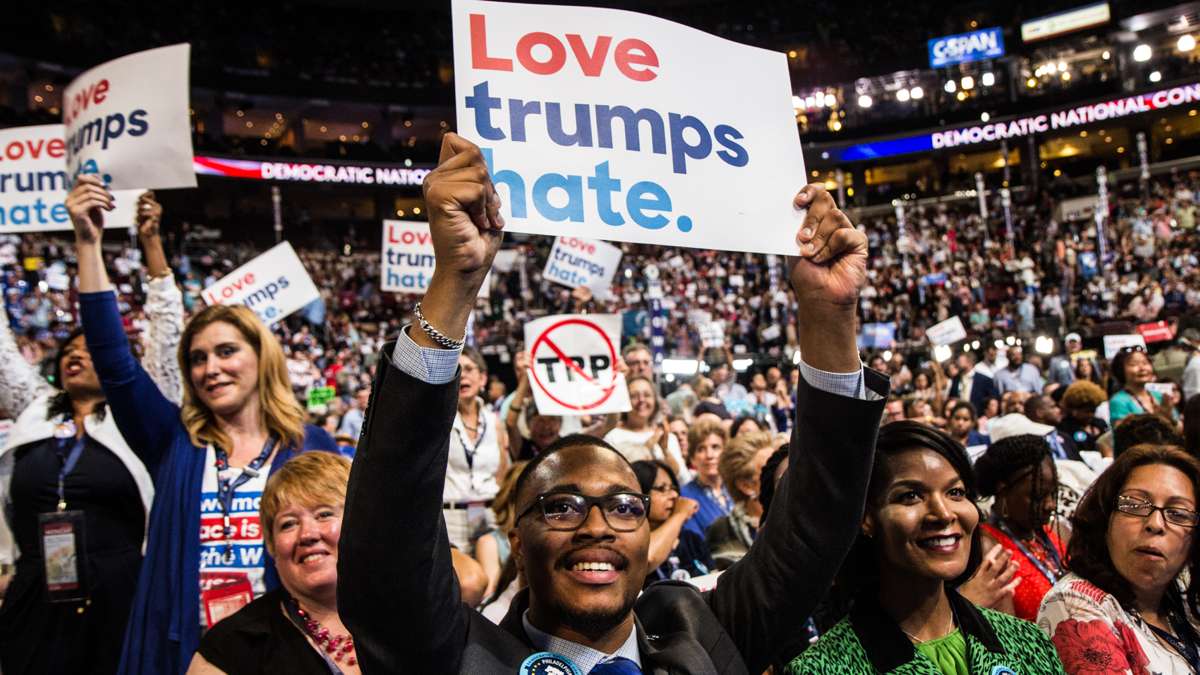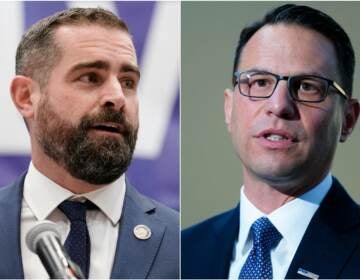Pa. Statehouse likely getting first openly gay lawmaker of color
Listen 2:05
Malcolm Kenyatta, who won the Democratic nod for the 181st district in the Pa. Legislature, cheers during the first night of the Democratic National Convention in Philadelphia in 2016. (Kimberly Paynter/WHYY)
The Pennsylvania Legislature is poised to soon make history as it welcomes its first openly gay lawmaker of color.
Malcolm Kenyatta won the Democratic nomination for Philadelphia’s 181st District during last week’s primary, and, given the city’s voter registration numbers, is strongly favored to assume the seat.
For the 27-year-old, who grew up in the projects, the idea of being a role model is appealing.
“When I grew up, there were not many black LGBT figures in politics or public life,” he said. “So if there are folks who can look to any aspect of who I am: ‘Malcolm’s young, Malcolm’s passionate, Malcolm’s living in his truth, Malcolm’s openly LGBT.’ That’s great.”
His sexual orientation is only part of who he is. He’s a Temple graduate; an activist who is the grandson of activist Muhammad Kenyatta; a delegate to the 2016 Democratic National Convention; and, as he likes to describe himself, North Philadelphia’s biggest cheerleader.
Yet, his opponents targeted his sexuality to wage a political attack.
On election day, fliers were found all over Kenyatta’s district depicting an old Facebook image of Kenyatta and his former husband, who was crossed out in red. Under the photo, there was a past message from Kenyatta to his ex: “Thank you for saying ‘yes.’ … Thank you for this 1st year of marriage.”
In capital letters were the words “MALCOLM KENYATTA” and “NORTH PHILLY SAY NO!!!!!”
Nevertheless, voters said, ‘Yes.’ Kenyatta beat out four opponents with 42 percent of the vote.
Kenyatta dismissed the smear.
“I’m disappointed that somebody thought so little of the people of the district that they would pick politics over vision,” he said. “It’s sad that they think that’s still where we are.”
He said voters told him repeatedly that they cared about quality candidates, not about who those candidates dated.
“They wanted candidates that would speak about the issues that impact them, like higher wages, quality public schools and affordable housing,” he said. “They want the best candidates, in spite of how they worship, where they’re from or who they love. I think that is the clear, resounding message that came out of the election.”
Kenyatta won in the 181st district, where African Americans make up more than half the registered voters, and where there has been less support for LGBTQ rights. About 39 percent of black Americans favor gay marriage — but that represents a significant shift, says Heath Fogg Davis, an associate professor of political science at Temple.
Davis says black voters views on LGBTQ issues evolved with former president Barack Obama’s administration. He pointed out that in 2009, only 29 percent of African Americans supported gay marriage.
Davis says he’s excited that Kenyatta will have a seat at the table to push for policy measures that will benefit Pennsylvanians in the LGBTQ community. He says that Kenyatta’s political agenda, coupled with his identity, reflects an intersectionality that speaks specifically to black LGBTQ voters.
“I think Malcolm’s agenda is politically savvy, but I think it makes moral and practical sense to talk about how these issues impact different members of the black community in different ways,” says Davis, who points out that LGBTQ Philadelphians are disportionately affected by homelessness than the general population.
Kenyatta will run against former state senator T. Milton Street in the general election in November. Street, a Republican, ran unopposed in the primary.
State Rep. Brian Sims (D-Philadelphia) is the first openly gay elected state lawmaker in Pennsylvania history. Former State Rep. Mike Fleck (R-Huntingdon) came out as gay in 2012 after being elected to four successive terms. He lost a Republican primary challenge in 2014, and then also lost in the general election that year.
WHYY is your source for fact-based, in-depth journalism and information. As a nonprofit organization, we rely on financial support from readers like you. Please give today.




